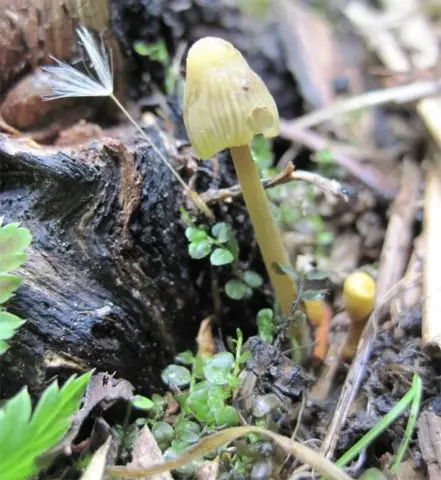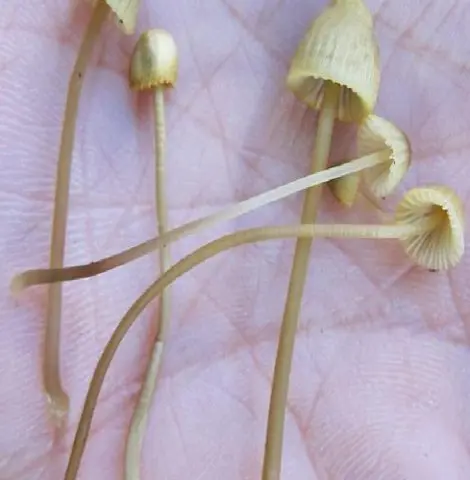Contents
Mycena yellow-bordered (from lat. Mycena citrinomarginata) is a miniature mushroom of the Mycenaceae family of the Mycena genus. The mushroom is beautiful, but poisonous, so it is better to refuse such specimens when hunting quietly. Mycena yellow-bordered is also called lemon-bordered, mycena avenacea var. Citrinomarginata.
What do mycenae look like yellow-edged
The mushroom cap grows no more than 2 cm in diameter, 1 cm in height. In growing specimens, the cap is presented in the form of an expanding cone, then becomes convex, parabolic. The surface is smooth, without roughness, there are radial grooves.

The color can be either bright yellow or pale, greenish, light olive, with a gray or brown tint. The center is always darker than the edges.
The plates are rare, semi-adhered to the stem, about 20 pcs. in one hat. Their color is off-white, changing as the mycena grows yellow-lined to gray-brown. The edging also changes color from slightly lemon to a dark shade, sometimes becoming whitish.
The leg is long and thin, reaches 8-9 cm, thickness up to 1,5 mm, very sensitive. This is the most fragile part. Smooth along the entire length, at the very base it expands slightly. On the perimeter has a small pubescence. The color is pale yellow with a greenish or gray tint. Near the cap, the color is lighter, at the bottom it acquires brown shades. At the base, there are almost always curving long fibrils of white color, sometimes rising high.

The pulp is yellow-edged, not fleshy, white translucent in color. The smell is pleasant, mild, reminiscent of radish.
Where do mycenae grow yellow-edged
These mushrooms are distributed throughout the world. The species grows in large close groups, sometimes single specimens are found. They can be found not only in mixed forests, but also in glades, in city parks, in mountainous regions and lowland plains. They like to hide in last year’s leaves and among the branches of common juniper, in swampy areas, on cemetery paths.
Grow from July to November frosts.
Is it possible to eat yellow-lined mycenae
Edibility is unknown, scientists have found hallucinogens of the indole group and muscarine-like alkaloids in mushrooms. Most mushrooms from the genus Mycenae are poisonous. They provoke auditory and visual hallucinations: stationary objects begin to move, colors become brighter, the perception of reality changes, which affects speech and sensitivity to sounds. Muscarine, which is part of the yellow-lined, can cause severe poisoning.
Conclusion
Mycena yellow-banded, eaten in large quantities, can be fatal. At the first sign of poisoning, an ambulance should be called. Before the arrival of doctors, you need to clean the stomach and intestines, causing vomiting.









